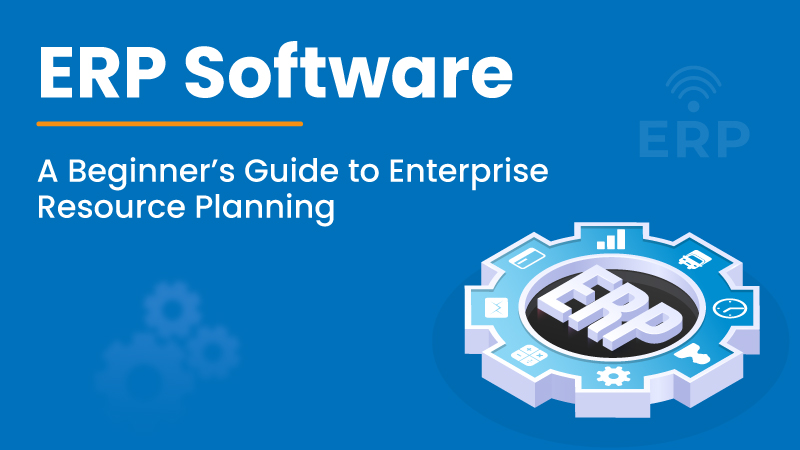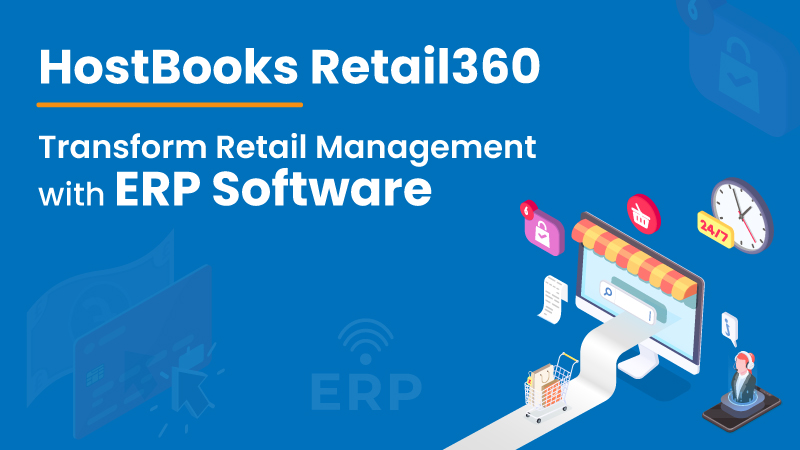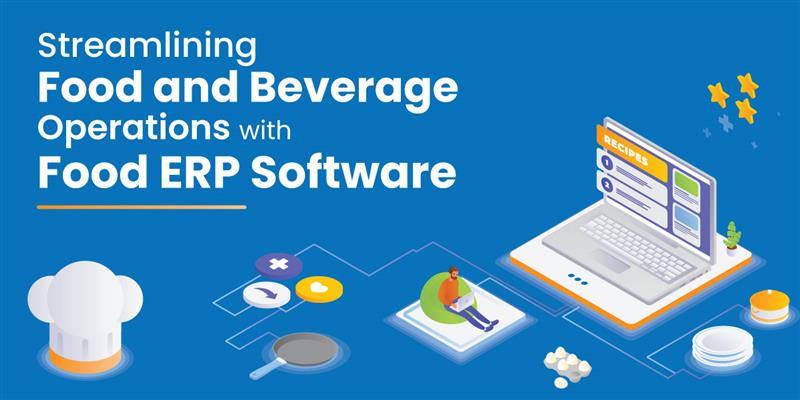What is ERP Software? A Beginner’s Guide to Enterprise Resource Planning

Table of Contents
1. Introduction
2. Introduction to Enterprise Resource Planning (ERP)
3. Why is Enterprise Resource Planning Important?
4. ERP Examples by Industry
5. How Do ERP Systems Work?
6. Types of ERP Deployment
7. Benefits of ERP Software
8. ERP Implementation Challenges
9. Future of ERP
10. Conclusion
11. Frequently Asked Questions
Introduction
In today’s fast-paced business environment, ERP software is crucial in managing and automating various aspects of business operations. Enterprise Resource Planning (ERP) software helps organizations streamline processes, improve efficiency, and gain real-time insights into operations. But what exactly is ERP, and why is it essential for businesses of all sizes?
Key Takeaways
ERP software integrates various business functions, improving efficiency and streamlining processes.
HostBooks ERP offers AI-driven capabilities, real-time data synchronization, and customizable solutions for businesses of all sizes.
Cloud-based ERP systems provide scalability, cost-efficiency, and the flexibility to access data remotely.
ERP implementation can face challenges like high upfront costs, integration difficulties, and employee resistance, but choosing the right system can mitigate these issues.
The future of ERP software includes advancements like AI, cloud solutions, and IoT integration for improved decision-making and operational visibility.
Two-tier ERP and Hybrid ERP models offer flexible solutions for businesses with complex operations and multiple locations or departments.
Introduction to Enterprise Resource Planning (ERP)
Enterprise Resource Planning (ERP) refers to integrated software applications that manage business functions, from accounting and HR to manufacturing and supply chain management. It offers a unified platform to automate routine tasks, manage business operations, and facilitate better decision-making by providing real-time access to data.
ERP systems are the backbone of modern businesses, ensuring that all departments work with the same data and processes. This eliminates silos and enhances collaboration across functions, which is particularly crucial for larger organizations or those with complex operational needs. ERP software offers a scalable solution for smaller businesses that grow with the company.
Why is Enterprise Resource Planning Important?
ERP software is crucial in that it brings together enterprise functions, does away with obsolete methods, and makes the rest of the job so much easier. It offers the capabilities to businesses to automatically deal with monotonous chores by way of significantly reducing the human error factor and manual work. ERP software automation is undertaken that spans across all the business protocols, this provides real-time data on any activity that has been integrated and the business can thus make such data-driven decisions as regards every aspect of the operations that will enhance overall performance.
The use of a strong ERP system will also support the company in the achievement of compliance with internal policies and external regulations. It confirms that starting from financial reporting, through data security to tax regulations that companies hold on to all the prerequisites that have been set. In the very beginnings of the data EPR solution revolution, their comprehensive ERP system emerges as an asset to the enterprises.
ERP Examples by Industry
Different industries rely on ERP systems to address their unique operational challenges. For example:
Manufacturing ERP software is aimed at inventory management, production scheduling, and work order management, helping manufacturers streamline their operations and increase productivity.
Retail ERP software grants enterprises the ability to adjust stock levels, follow customer orders, and improve sales through a variety of channels.
The hotel ERP software suite has instruments for bookings, room availability, guest preferences, and employee scheduling, to top it off, it brings order and harmony to the whole premises in the hospitality industry.
The system for food and beverage ERP software takes into account issues of inventory control that covers compliance issues and quality assurance.
No matter the industry, ERP solutions offer a comprehensive way to manage operations more effectively from the ground up.
How Do ERP Systems Work?
An ERP system integrates various business functions, allowing data to flow seamlessly across departments. These systems are typically modular, meaning businesses can select and implement specific modules based on their needs. Standard modules include financial management, human resources, supply chain management, and sales/purchase management.
For example, HostBooks ERP takes this integration to the next level by offering real-time data synchronization across all business functions.
HostBooks ERP is a fantastic tool for tracking inventory levels, managing payroll, or creating reports. It ensures that all data is up-to-date and accurate. With its AI-driven capabilities, HostBooks ERP can automate processes, reduce manual effort, and provide powerful insights that help businesses make informed decisions
Types of ERP Deployment
ERP system vendors have made a variety of deployment options available to potential adopters by hosting on-site or the cloud. This allows for the software to be close to the business processes, allowing the users to get benefits from the technologies.
On-Premise ERP
With on-premise ERP, the software is hosted on the company’s servers. This offers complete control over the system but comes with higher upfront costs and ongoing maintenance. Larger enterprises with the infrastructure to support it often favor this deployment method.
Cloud ERP
Cloud-based ERP solutions, such as HostBooks ERP, are hosted on remote servers and accessed via the Internet. This option reduces the need for internal IT infrastructure, offers scalability, and provides access to the system from anywhere. HostBooks ERP offers a cloud ERP solution that gives businesses the flexibility and agility needed to thrive in a fast-paced market.
Two-tier ERP refers to a deployment model in which a company typically uses two ERP systems—a more robust, centralized ERP solution for corporate headquarters and a more straightforward, specialized ERP for remote locations, subsidiaries, or departments. This model allows companies to cater to the specific needs of different divisions while maintaining overall integration with the core ERP system.
The two-tier model is particularly beneficial for large organizations with multiple locations requiring different processes or operations. For example, a multinational company may use a global ERP system for its headquarters but implement a more localized ERP solution in each regional office to accommodate regional regulations and business requirements.
The Two-tier ERP system offers advantages such as:
Cost Efficiency: Localized ERP systems are more affordable and easier to implement.
Flexibility: Companies can choose ERP systems that are best suited to the needs of each location or department.
Scalability: As businesses grow, the system can quickly scale by adding new tiers.However, this model’s challenge is ensuring seamless integration and data synchronization between the two ERP systems, which requires careful planning.
Read our Guide to Distribution ERP Software to understand how ERP helps in the distribution sector.
Hybrid ERP combines on-premise and cloud-based ERP solutions. This approach allows businesses to take advantage of both the reliability and control of on-premise systems and the flexibility and scalability of cloud-based solutions. Critical operations may be managed on-premise in a Hybrid ERP model. At the same time, non-essential functions, such as HR, finance, or customer relationship management, are handled through a cloud-based solution.
For businesses with complex requirements or those transitioning to the cloud, the Hybrid ERP model offers a balanced approach. It provides the best of both worlds:
Customization and Control: Businesses can keep their core processes secure with on-premise deployment.
Flexibility and Cost-Effectiveness: Non-critical functions can be moved to the cloud, reducing IT infrastructure costs and improving scalability.
Faster Implementation: A Hybrid system allows for quicker deployment of cloud solutions, while on-premise systems can be phased in gradually.
Many businesses are adopting the Hybrid ERP model because it allows them to gradually move towards cloud-based solutions without abandoning their on-premise systems altogether. This ensures a smoother transition and greater flexibility as technology continues to evolve.
These two deployment options, Two-tier ERP and Hybrid ERP offer unique benefits and challenges, making them suitable for different business needs. The right choice will depend on the organization’s size, complexity, and future scalability goals.
Benefits of ERP Software
Adopting ERP software brings numerous benefits to businesses of all sizes. ERP software drives efficiency, accuracy, and productivity by integrating various business functions into a unified system.
1. Improved Efficiency and Productivity: One of the most significant advantages of ERP software is its ability to streamline business processes by automating repetitive tasks. From accounting and inventory management to customer relationship management, automation reduces human errors and improves overall operational efficiency.
2. Real-Time Data Access: ERP software gives businesses real-time access to critical data. This enables organizations to make data-driven decisions quickly, which is essential in today’s fast-paced market. HostBooks ERP , for example, offers seamless real-time data synchronization, ensuring businesses always have the most up-to-date information.
3. Better Collaboration and Communication: ERP software improves collaboration and communication within an organization by providing a central platform for all departments. It eliminates data silos, making it easier for teams to access and share information, ultimately leading to better decision-making.
4. Cost Savings: ERP systems help businesses reduce operational costs by improving efficiency, eliminating redundancies, and reducing the need for manual labor. With enhanced visibility into financials, companies can identify areas for cost savings and optimize spending.
5. Scalability: As businesses grow, so do their needs. Modern ERP systems, like HostBooks ERP, are designed with scalability in mind. They can quickly adapt to changing requirements, whether a business is expanding its product line, entering new markets, or adding new departments.
ERP Implementation Challenges
Although the advantages of ERP software are obvious, the implementation process can be hard and difficult. Some of the common challenges that companies encounter during ERP implementation include:
1. High Upfront Costs: To install an ERP system it is a big investment. Not only is the software itself a huge investment, but so is the training, customization, and potential infrastructure upgrades. Small businesses may not have the initial capital to afford this, however, cloud-based solutions like HostBooks ERP are the alternatives and come at a more practical cost.
2. Customization and Integration: Customization and Integration: Customizing, and integrating ERP systems with existing software and business processes may be a time-consuming and hard task. Even though ERP products can be adjusted, aligning the program with a specific company’s needs needs proper preparation and knowledge.
3. Resistance to Change: Employees may resist transitioning from old systems to a new ERP platform, mainly if they are accustomed to legacy software or manual processes. Successful ERP implementation requires strong change management strategies, including employee training and support.
4. Data Migration: Data migration from the present groundwork to the brand new system, Significant p is in fact the simple thing that will be without a shadow of doubt puzzling, especially if data volumes are huge. The new system’s success will largely depend on the accuracy and consistency of the data during the migration process.
5. Lack of Internal Expertise: ERP system implementation and maintenance can be a tiresome process due to the fact that it is quite a demanding job that requires a lot of knowledge. Businesses often face the difficulty of finding experienced personnel or appointing consultants to guide the process and to provide the post-deployment system a smooth operation.
Explore the key challenges of ERP implementation and how to overcome them.
Future of ERP
The future of ERP software is bright, with continuous technological advancements shaping how businesses operate. Key trends to watch for include:
1. AI and Machine Learning: Integrating artificial intelligence (AI) and machine learning in ERP systems transforms how businesses manage data. AI-driven ERP software can analyze large datasets to identify trends, automate decision-making, and provide predictive insights that help companies plan for the future.
2. Cloud-Based Solutions: Cloud-based ERP systems continue to grow in popularity due to their scalability, flexibility, and cost-effectiveness. Businesses are increasingly moving away from on-premise systems in favor of cloud solutions, which offer easy access to real-time data and allow for remote work.
3. Mobile ERP: As mobile technology progresses with lightning speed, ERP platforms start to embrace the newest development, i.e. mobile application support. Personnel are able to obtain and work with ERP data from anywhere. This leads to real-time decision-making and increased productivity in general.
4. IOT Integration: In the future, IoT (Internet of Things) is the technology that will drive the ERP software in the future. Noteworthy to outline is that ERP systems can monitor the physical assets and adjust them in time with IoT integration real-time giving out important information about the inventory, equipment, etc.
Conclusion
In conclusion, ERP software offers immense business benefits, from improved efficiency and real-time data access to cost savings and scalability. While ERP implementation can present challenges, choosing the right ERP system, like HostBooks ERP, can help businesses overcome these obstacles and unlock their full potential. As technology advances, the future of ERP software promises even more opportunities for businesses to enhance their operations and stay ahead of the competition.Looking for the best ERP software to streamline your business? Discover HostBooks ERP today!
Frequently Asked Questions
1. What is an ERP Software?
The ERP software integrates various essential business functions into a single part of a company, allowing businesses to carry out processes like finance, stock, sales, and HR from the same platform.
2. What is the reason for the movement to cloud-based ERP?
Cloud-based ERP systems provide scalability, lower IT infrastructure costs, remote access, and real-time data synchronization.
3. What is the difference between ERP and MRP?
While ERP manages all business operations, MRP focuses primarily on manufacturing processes, including materials planning, inventory control, and production scheduling.
4. What challenges come with ERP implementation?
Common challenges include high upfront costs, integration with existing systems, resistance to change, and data migration.
5. How is HostBooks ERP helping businesses?
HostBooks ERP includes AI-driven capabilities, seamless integration, real-time data synchronization , and scalable solutions that are created to optimize business operations and thus make it an ideal choice for businesses of all sizes.

Try HostBooks
SuperApp Today
Create a free account to get access and start
creating something amazing right now!
















